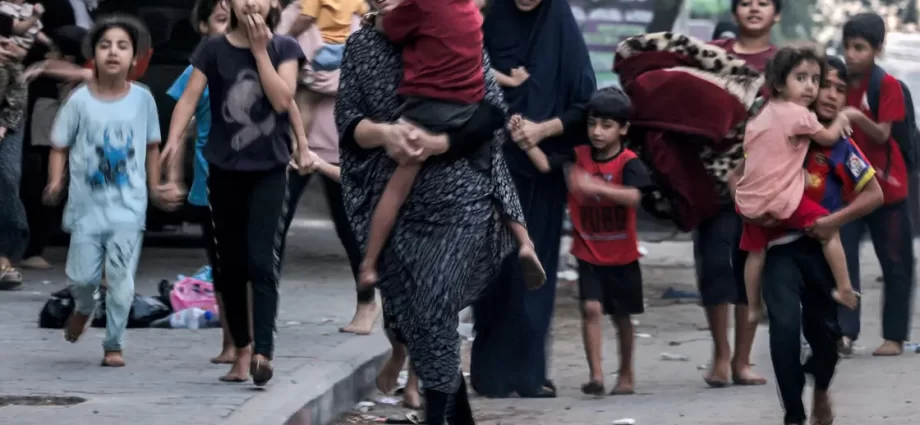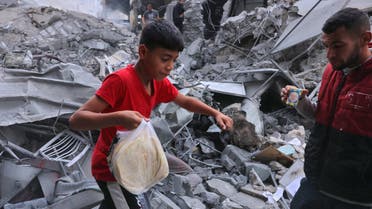Situation in Gaza ‘catastrophic’ as food, water supplies dwindle: UN WFP
The situation in Gaza is catastrophic, as food, water and electricity supplies in the besieged city continue to dwindle, a spokesperson for the World Food Programme (WFP) told Al Arabiya English on Wednesday.
“The situation is catastrophic. Gaza is on the brink of running out of food, water, and electricity,” Alia Zaki, the Head of Communications and Information Management at the Palestine Country Office for the UN’s World Food Program, said.
Israel has been carrying out air strikes on Gaza for five consecutive days in response to an unexpected incursion into its territory by the militant group Hamas on Saturday.
Entire neighborhoods in the city have been reduced to rubble, leaving the majority of its 2.3 million people with no shelter and no access to food or water.
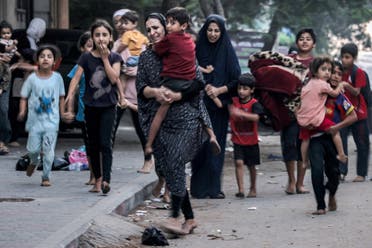
The damaged infrastructure has severely impeded food production and distributions at shops and bakeries monitored by the WFP, Zaki explained.
“Half of the shops and bakeries monitored by WFP will run out of food within one week. And for those still operating, frequent electricity cuts bring the threat of food spoilage,” she said.
Israel has put Gaza under a “complete siege,” preventing food and fuel from reaching the impoverished enclave where the United Nations estimates more than 80 percent of the population was already living in poverty.
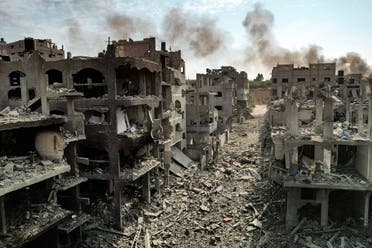
Wednesday afternoon saw an announcement from Gaza’s electricity authority saying that the enclave’s only power plant had run out of fuel and subsequently ceased operations.
“The only power plant in the Gaza Strip stopped functioning at 2:00 pm (1100 GMT),” the authority’s head Jalal Ismail said in a statement, after earlier warning that it was running short of fuel.
Residents can still use power generators for electricity; however, due to Israel’s blockade on all sides of the border, the fuel necessary to operate these generators is expected to deplete soon, Ismail added.
Completely cutting off electricity supply would damage the very little food stock Gazans have access to, Zaki emphasized.
Frequent electricity cuts and connectivity issues would also hamper the WFP’s operations in the city, she said.
The WFP has already launched an emergency operation to provide a vital food lifeline to over 800,000 people in Gaza and the West Bank, who lack access to food, water, and essential supplies, according to Zaki.
Ready-to-eat fresh bread and canned food has been delivered to 137,000 displaced Gazans who are seeking refuge in UNRWA shelters.
The WFP has also provided 164,000 people with an emergency cash top-up to their electronic vouchers that they can use to buy food from local shops that are still open.
However, nearly 175,500 internally displaced people are seeking shelter in 88 UNRWA schools across the Gaza Strip, with the numbers expected to increase as Israeli air strikes continue, the UNRWA said in its latest update report.
“Soon, our pre-positioned food stock and resources will shortly run out,” she told Al Arabiya English.
Humanitarian corridors must remain open
Multiple countries, including Sweden and Denmark, have said they would halt aid to Palestinian territories following Hamas’ surprise attack on Israel. After widespread criticism earlier this week, the European Commission backtracked its announcement that it would be suspending aid to the besieged city.
This comes as Norway, Spain, and several other countries and rights group have warned that the already dire situation in Gaza will only deteriorate if aid is suspended.
“The WFP calls for humanitarian corridors to bring aid into Gaza, borders be kept open and protected from shelling,” Zaki said.
The agency is working closely with local partners, other UN partners, and all stakeholders to coordinate for access and ensure the assistance is reaching those in need, she added.
Difficulties on the ground
As Israel continues to bomb Gaza, the city’s residents and aid workers are scrambling to find shelter.
Surrounded by rubble and with nowhere to hide, Gazans are faced with ever-growing uncertainty.
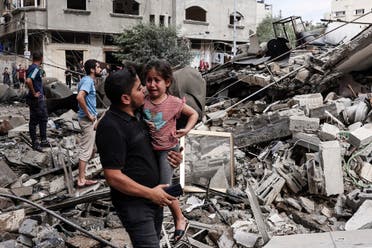
WFP staff are also struggling to ensure their safety while providing those in need with the basic necessities.
“We also appeal for the safe and unobstructed passage for our staff. Humanitarians must be protected,” Zaki told Al Arabiya English.
The UN’s Agency for Palestinian Refugees (UNRWA) said it lost 11 staff members in Gaza since October 7 as a result of Israeli air strikes.
Meanwhile, the International Federation of Red Cross and Red Crescent Societies (IFRC) said five of its members, including four paramedics, were killed in raids carried out by Israel.
The biggest concerns WFP staff on the ground are currently facing are safety and movement, according to Zaki.
“We rely on humanitarian workers on the ground who are doing everything they can while also being at risk themselves, facing displacement, and looking after their families and loved ones at the same time,” she said.
Read more:

